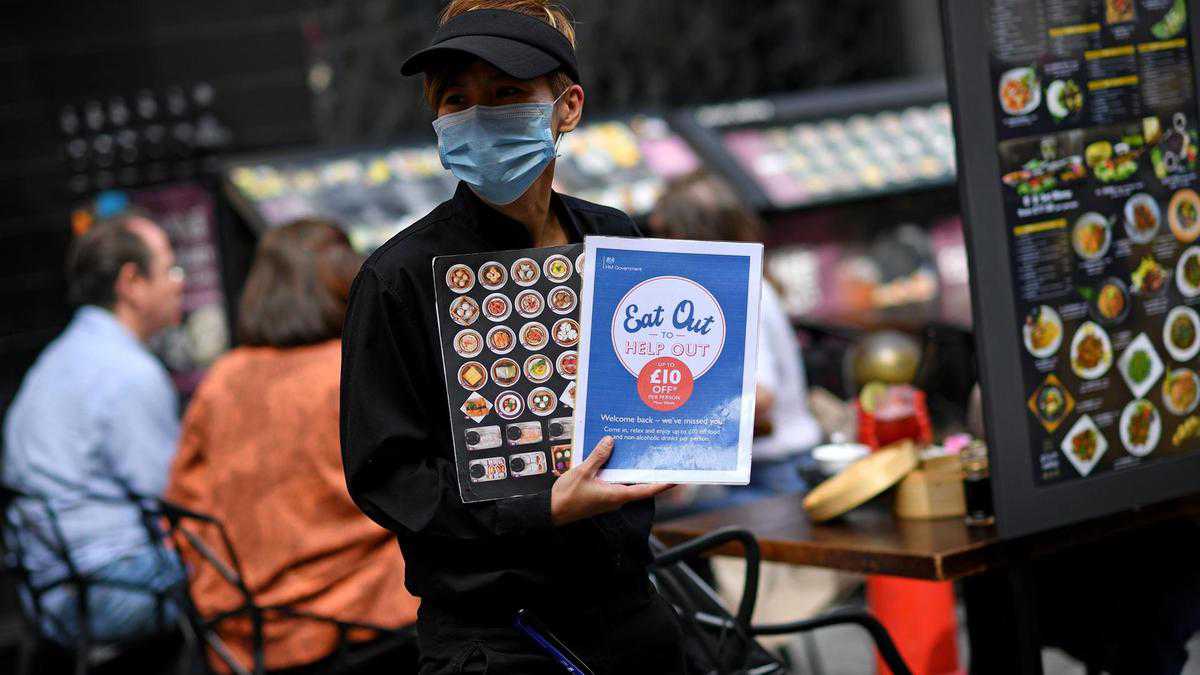UK's V-shaped recovery in danger
10 October, 2020

Britain's lacklustre economical growth in August caught out economists which were expecting a more healthy recovery on the back of Rishi Sunak’s much-lauded Eat Out to greatly help Out campaign.
The dining discount scheme, which saw a lot more than 100 million meals claimed through the federal government programme, set the government back £522 million. It had been designed to encourage the united kingdom population to invest heavily and set the united states on track for an ideal V-shaped bounce back, where a recession and subsequent recovery resemble a V-shape on an financial chart.
Instead, gross domestic product grew by a less-than-expected 2.1 % in August from July, disappointing analysts which were expecting a 4.6 % rise in output and ruling out the V-shaped recovery altogether.
“It seems gains are harder to come across as we stretch further in to the recovery, with today’s reading highlighting having less a ‘V’ shaped recovery,” said Josh Mahoney, senior market analyst at online trading company IG. “Instead, the very best we can expect is a lopsided, tick-shaped growth trajectory, with the opportunity of a second nationwide lockdown highlighting that even such a drawn-out process could possibly be optimistic.”
Economists were optimistic of an easy recovery after bumper growth in June of 9.1 per cent, accompanied by a 6.4 % rise in July - a move in the proper direction when set against the record contraction of 19.5 % in April when the UK was completely lockdown.
Rishi Sunak’s dining discount scheme was then likely to deliver another “impressive month of growth” as residents emerged from their homes to profit from the government-funded price reduced amount of 50 per cent on the meal, up to £10 per diner.
“It seems gains are harder to come by as we stretch further into the recovery, with today’s reading highlighting the lack of a ‘V’ shaped recovery,” said Josh Mahoney, senior market analyst at online trading company IG. “Instead, the best we can hope for is a lopsided, tick-shaped growth trajectory, with the likelihood of a second nationwide lockdown highlighting that even such a drawn-out process could possibly be optimistic.”
Economists were optimistic of an easy recovery after bumper growth in June of 9.1 per cent, followed by a 6.4 per cent rise in July - a move around in the proper direction when set against the record contraction of 19.5 % in April when the united kingdom was in full lockdown.
Rishi Sunak’s dining discount scheme was then likely to deliver another “impressive month of growth” as residents emerged from their homes to profit from the government-funded price reduction of 50 per cent on their meal, up to £10 per diner.
When the ONS released the GDP figures on Friday morning, the UK finance minister was quick to issue a statement on the results, conceding “that lots of people come to mind about the coming winter season”.
Some analysts expect more of a sideways move around in the condition of the recovery, with the unwinding of the government’s fiscal support worsening prospects for the next few months.
“We expect the new Covid-19 restrictions to imply that the economy does little more than move sideways in the ultimate three months of the entire year, leaving economic activity marooned 7.5 % short of its pre-crisis level,” said Ruth Gregory, senior UK economist at Capital Economics.
“So as the economy has recouped 64 per cent of the fall in GDP in four months, it might take until late-2022 to reunite the remaining 36 per cent. That’s why we think the Bank of England will yet expand Quantitative Easing by an additional £250 billion by the finish of next year, with the next tranche of £100bn coming this November.”
Looking forward to the coming quarters, Josie Dent, managing economist at CEBR, expects quarterly growth to slow, falling to just 0.4 per cent in the first quarter of 2021 with output not time for pre-crisis levels until the mid-2020s.
With the economy “not out of your Covid-quagmire yet”, some analysts say on face-value the rise in August indicates that the fabled ‘V-shaped’ recovery is still on track.
“However, this growth is likely to be reversed within the next quarter with non permanent hospitality closures sweeping across Scotland and several parts of England because of rising Covid-19 cases, naturally leading to waves of redundancies,” said Richard Pearson, director at investment platform EQi.
“With the risk of local lockdowns looming over consumers’ heads and hospitality redundancies coming, consumers aren’t likely to dance the night away in the coming months.”
Source: www.thenational.ae
TAG(s):
